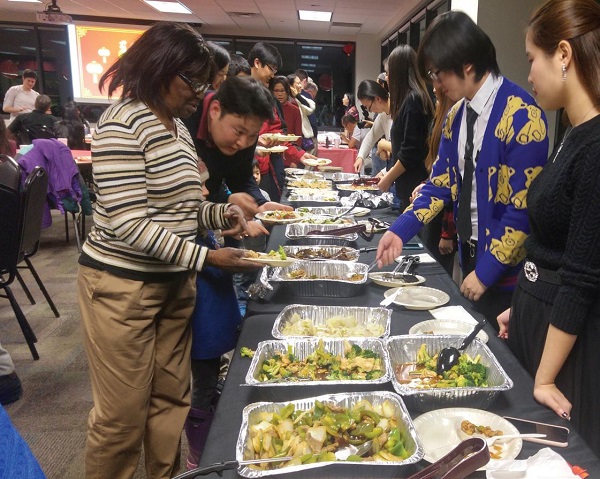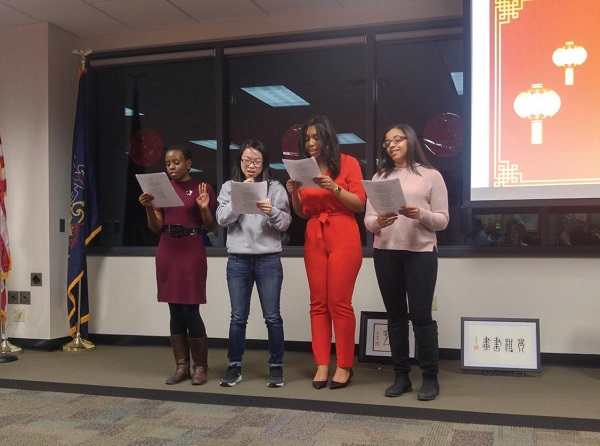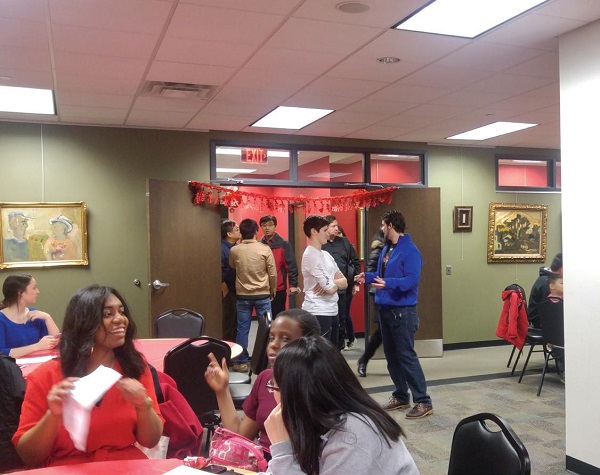

Photo Courtesy / Maddi Petro
By Maddi Petro
Staff Writer
ESU students and community members experienced a piece of Chinese culture this past Saturday at the Chinese Spring Festival.
Guests celebrated the beginning of the Year of the Rooster with martial arts, calligraphy, music and food.
“China’s spring festival is the biggest celebration in Chinese culture. It’s like their version of Christmas,” said Chinese Professor Yu, who worked with
ESU’s Chinese Club and Modern Language Department to co-organize the festival.
“We have a lot of Chinese community here, and professors and students who are studying Chinese, so we organize this event to share how we celebrate our new
year,” she continued.
Chinese New Year is a 15-day celebration ending with the Latin Festival, explained Yu.
February 11 was the day of this year’s Latin Festival, which is why Yu and her fellow organizers chose the date for the 2017 festival.
Julia, the festival’s MC, guided guests through the night’s performances with stories about Chinese New Year, its rituals and what the holiday means to her.
The first performance Julia introduced was a martial arts demonstration by two ESU professors: Dr. Stanley Chiang and Dave Daniel.
Chiang, in a white Tai Chi uniform, and Daniel in a black one, took turns demonstrating forms of Tai Chi.
“It may look like arm and leg movements,” said Chiang between demonstrations, “but all these movements are self-defense moves.”
Chiang explained how throughout history there was a greater need for self-defense. Although many use Tai Chi for focus and breathing today, all martial arts
started as selfdefense.
Chiang and Daniel’s demonstrations hit home for student Zheng Qianqian, who comes from Chenjiagou, China, where Tai Chi was founded.
English Professor Cynthia Leenerts, who visited China in the summer of 2015, said, with a laugh, that she feels safer knowing that two ESU professors are
martial arts experts.
After the demonstration, artist Lewei Shang presented his calligraphy and the zodiac artwork.
“Calligraphy is like a picture, but also a language,” said Shang. “What I’m trying to do is make Chinese calligraphy understandable for all.”
Throughout the night, he painted Chinese Zodiac characters for guests based on their birth years. Shang’s artwork combines recognizable symbols with Chinese
characters.
For the artwork he painted during the festival, he modified the Chinese characters for each zodiac animal in three different ways so that each character
looks like the animal it represents.
“Calligraphy is inventive and amazing,” said visiting professor Zhang Congpei. “It’s a new form I never had access to before.”
Congpei, along with Liu Xiufen, are English professors visiting ESU from Henan University in China.
Chinese I and II students sang Chinese new year songs following Shang’s calligraphy presentation. The first song was about a flower and the second was about
a girl looking for her love, as MC Julia explained.
The group of four sang acapella, but the audience joined in by clapping to the songs.
“I think the songs were beautiful,” said Xiufen. “And I liked that all of us could join in.”
Brandon Mays, junior, came to the festival because of his interest in Tai Chi, but said he enjoyed other parts of the festival, too.

Photo Courtesy / Maddi Petro
“I found the singing very cool,” said Mays. “I liked when everybody started joining along. Food is awesome, definitely met expectations and beyond.”
The food, which was served after the singing, included rice, noodles, vegetables, chicken, spring rolls and more from Khan’s Mongolian Grill & Bar in East
Stroudsburg.
The large dishes were empty before the end of the night.

Photo Courtesy / Maddi Petro
“The festival is a lot larger than I expected,” said business management Professor Daniel, advisor of ESU’s Tai Chi and Chinese Internal Arts Club. “The
people are great, food is great, great way to expose students to traditional Chinese culture.”
Deja Shelton, a freshman who sang the Chinese songs earlier that night, agreed with Daniel.
“I came here to show my love and support for Chinese culture and to support Professor Yu for making us really enjoy Chinese,” said Shelton. “I hope everyone
here takes some interest in Chinese culture or language.”
“Oh, and I came here for the dumplings!” said Shelton, sharing laughter with fellow guests and performers at her table.
Email Maddi at:
mpetro3@live.esu.edu
